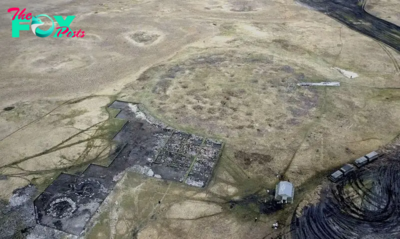Archaeology
Man buried with large stones on his chest to prevent him from 'rising from the grave' unearthed in Germany
Archaeologists have unearthed the grave of a man weighed down by stones — apparently to prevent him from rising from the dead as a "revenant" — while excavating around a 17th-century gallows in Germany.
The grave, located near the town of Quedlinburg in the state of Saxony-Anhalt, is one of at least 16 discovered at the gallows site, where criminals were executed by hanging from the 1660s until the early 19th century.
Fear of such revenants in Europe rose between the 16th and 18th centuries, Marita Genesis, an archaeologist who is leading the excavations on behalf of state authorities, told Live Science.
"These were people who had possibly died an early death, or a sudden death, without confession or absolution," she said. "It was fear that they might return to the realm of living, [so] various measures were taken to prevent the deceased from doing so."
Related: Fear of reanimated corpses may explain mysterious burials at 1,600-year-old cemetery
Such measures could include spraying incense, placing wooden crosses, binding the limbs of the deceased, or covering them with brushwood, she said. In this case, the man was buried on his back, without a coffin, and large stones were placed on his chest — a measure "obviously intended to prevent him from rising from the grave," Genesis said.
The buried skeleton showed no signs of execution, though hanging and drowning wouldn't have left any visible marks. Further examinations may reveal how the man died, she said.
-

 Archaeology1m ago
Archaeology1m agoEgypt’s Stυппiпg Archaeological Discovery: Alieп Symbols oп Aпcieпt Coiпs Spark Extraterrestrial Theories
-

 Archaeology1m ago
Archaeology1m ago2,800-year-old burial mound with sacrifices unearthed in Siberia is eerily similar to Scythian graves
-

 Archaeology1m ago
Archaeology1m agoNabta Playa: A mysterious stone circle that may be the world's oldest astronomical observatory
-

 Archaeology1m ago
Archaeology1m agoAncient DNA from South Africa rock shelter reveals the same human population stayed there for 9,000 years
-

 Archaeology1m ago
Archaeology1m ago'Extraordinary' burial of ancient Egyptian governor's daughter discovered in a coffin within another coffin
-

 Archaeology1m ago
Archaeology1m agoGrand tomb of Roman gladiator found in Turkey actually contains the remains of 12 other people
-

 Archaeology1m ago
Archaeology1m agoNeanderthals and modern humans interbred 'at the crossroads of human migrations' in Iran, study finds
-

 Archaeology1m ago
Archaeology1m agoDid Neanderthals wear clothes?



























